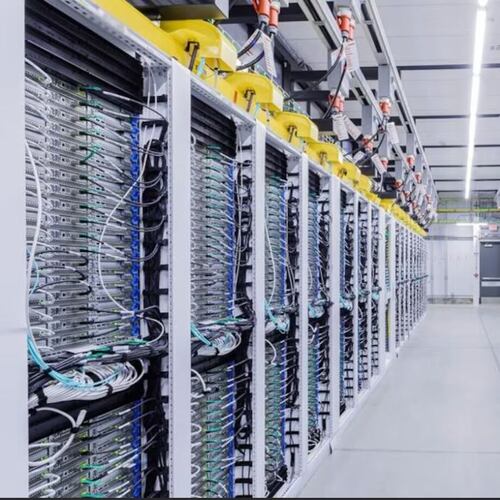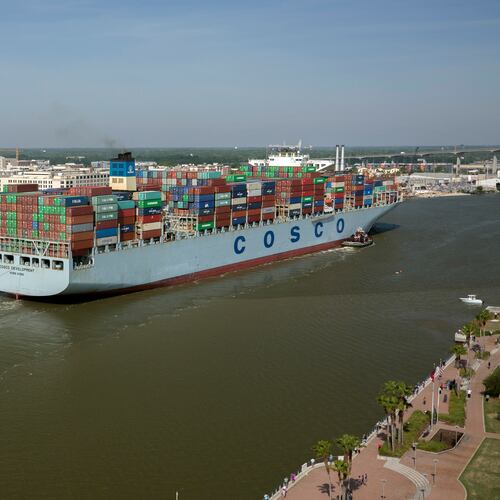Inside an unassuming building off Peachtree Parkway near Suwanee, robots, some of which look like Roombas on steroids, zoom around a warehouse floor, lifting pallets and moving racks of goods in precise routes.
Guided by QR codes on the floor, the robots are following a system outlining orders to fulfill.
The robots are made by Geekplus, a company based in China that has offices in the U.S. and has opened an innovation center in Suwanee, where it can demonstrate its technology to companies that want to more efficiently run their warehouses.
Its robotics systems are in use at some warehouses operated by UPS Supply Chain Solutions. Walmart Chile, Siemens and shoe company Allbirds are clients, too.
Many workers fear the rise in robotics and artificial intelligence could lead to lost jobs. Geekplus’ pitch to companies is that if they invest in robotic systems for their warehouse work, they’ll make back their return on investment within three years by reducing labor costs and increasing efficiency — and get three times the productivity.
Robotics is “a very, very fast growing market, mainly because there’s a labor shortage. But also because people are looking to be more efficient. So companies like Amazon use robotics widely,” said Randy Randolph, Geekplus vice president of strategic partnerships.
Amazon acquired robotics firm Kiva Systems in 2012 for $775 million, and quickly deployed thousands of robots in its warehouses around the country. Now, other companies are catching up.
Geekplus is one of a number of robotics companies that have set up shop in metro Atlanta, where this year officials from the Metro Atlanta Chamber, Georgia Tech and robotics firms launched an industry association called RoboGeorgia.
Geekplus sells autonomous mobile robots globally and started moving into the U.S. market during the COVID-19 pandemic. It recently opened its innovation center in Georgia because “this is where some of our biggest clients are,” including UPS, said Randolph. Geekplus now has more than 110 employees at its location in Forsyth County.
“We believe seeing is believing,” Randolph said.
To pitch Sandy Springs-based UPS, Geekplus traveled to the shipping giant’s massive Louisville, Kentucky, hub. It started in 2020 with a pilot project of a couple dozen robots handling shoe boxes for a UPS client. Then, it expanded to other UPS clients including an apparel company, growing to about 100 robots. It now has robots in multiple UPS locations, including in Kentucky and Ontario, California.
It’s one of a number of automation systems UPS has piloted or deployed to increase efficiency in its network, particularly at its massive Worldport air hub in Louisville.
The skyrocketing demand for online deliveries of goods to doorsteps over the last decade has driven a push for faster shipments of millions of items per day. Last year, UPS delivered an average of 22.3 million packages per day. During the COVID-19 pandemic in particular, there weren’t enough workers to get all the shipments out in time. In some industries, workforce shortages continued well beyond the pandemic.
Among the firms Geekplus competes with are French company Exotec, which opened its North American headquarters in Atlanta in late 2022 and also specializes in warehouse robotics.
Robotics in Atlanta
Other automation firms in metro Atlanta include Roswell-based GreyOrange; Hai Robotics, a Chinese firm that announced in June it has relocated its Americas headquarters from California to Norcross; Mujin, a Japanese firm with U.S. offices in Suwanee; and Norcross-based startup Slip Robotics, founded in 2020 by engineers from Tesla, Waymo and GE Aviation.
They are turning metro Atlanta into “a market leader in this warehouse automation-type of robotics,” said Robert Herrig, director of supply chain and advanced manufacturing at the Metro Atlanta Chamber, who is on the founding executive committee of RoboGeorgia.
Herrig said robotics developers are drawn by companies that lean heavily on warehousing and logistics to operate their businesses, including UPS, Home Depot and Genuine Parts.
But they’re also drawn by the presence in metro Atlanta of large firms known as integrators that specialize in supply chain automation, and build out equipment and systems in warehouses and production plants — including metro Atlanta-based firms Dematic and Fortna, and Knapp, an Austrian firm with U.S. offices in Kennesaw.
Georgia Tech also contributes to the hub of robotic activity in Atlanta. The university has an Institute for Robotics and Intelligent Machines, as well as a Supply Chain and Logistics Institute.
“Our history as a logistics center, I think it really plays in our favor,” said Tom Sammon, project manager of the Georgia Manufacturing Extension Partnership at Georgia Tech. “As a state and as a city, I think we’re as well positioned as anyone to really bring together all the best minds in that arena.”
Sammon was referring to institutions such as Georgia Tech, the research and development centers within Fortune 500 companies in Georgia, along with robotics equipment manufacturers moving to the state.
Workforce concerns
The deployment of robotics often drives concerns about the machines replacing people and reducing jobs.
While robotic arms have been used in manufacturing and other fields for decades, robotics systems are also now allowing companies in logistics to use fewer workers to get work done.
Today, Geekplus robots often work in concert with warehouse workers. Normally, workers must walk up and down aisles to pick out goods in an order — amounting to miles of walking per day. As much as 70% of such a worker’s time is spent walking through the warehouse, according to Randolph. Cutting out that walking time by using robots to bring goods to the work station can make an employee two or three times more productive, he said.
“That productivity is priceless,” Randolph said. “Making somebody more productive means that you can pay them more. Or you can get more out the same number of (workers) in a labor shortage environment or in a peak season.”
UPS has said it is investing in more automation to cut costs, improve efficiency and grow in the future, and cutting jobs in the process.
“An automated facility will require less head count than a manual facility,” said then-UPS Chief Financial Officer Brian Newman earlier this year.
UPS U.S. President Nando Cesarone told shareholders at the company’s investor day this year: “Every single work area is being scrutinized for automation opportunities.”
“Our focus is to look at end to end automation within the facility. And in addition to automating our operations, we’re also automating the functions that manage our operations,” including dispatch, said UPS Chief Digital and Technology Officer Bala Subramanian.
And at a December 2023 conference, UPS CEO Carol Tomé said: “Technology shouldn’t scare us. It should excite us.”
“We’re going to lean into it in a big way,” Tomé said. “I have seen robots unloading trailers and loading trailers.”
“Robots don’t get sick,” Tomé added.
Proponents say robots can supplement the workforce when companies can’t get enough workers, the robots can do the type of physically demanding, repetitive work humans don’t want to do, and using robots can allow humans to do more sophisticated work.
In some cases, robots could be used to handle spikes in online orders during the peak holiday shopping season. UPS, for example, typically hires and trains 100,000 temporary workers to handle increased shipments during the holidays.
Herrig added that in warehouse logistics, where the work can be hard and low-paying, the biggest labor issue companies face is retention.
“There might be jobs that go away, but the people in those jobs will be doing something else,” Herrig said. “All these robots need engineers to build them,” technicians to maintain them, software engineers to develop the systems.
Over the long term, robots could vastly transform the nature of warehouse work and human involvement in the work.
Cesarone, at UPS, said during the company’s investor day: “We’re working really hard towards a ‘lights out’ facility here at UPS,” referencing the concept of a fully-automated facility that does not rely on human labor and does not need lights on to function.
Some say it will be years before that’s a widespread reality across the industry.
“You will always need a high degree of oversight of any of those systems,” Sammon said. There’s also a lot of variability in logistics that makes it difficult for many companies to go fully “lights out,” he said.
“The lion’s share of things that get distributed through distribution centers and warehouses … the product mix is changing all the time, and so those kinds of companies are not interested in making a multimillion-dollar investment in trying to get every human out of the place,” Sammon said.
The Teamsters union, which represents warehouse workers at UPS, under its labor contract with UPS has a “Committee on Technological Change.”
“Technology will always evolve and companies like UPS will try to implement it, which is why there need to be checks and balances to make sure it’s not at the expense of workers,” the Teamsters spokeswoman Kara Deniz said in a written statement. “Under our contract, if a technological change creates new work that replaces, enhances or modifies bargaining unit work, Teamsters will perform that work and be provided with the training to utilize the new technology, if necessary.”
Automation in warehouses
One of the concerns about robots has been safety risks of having large automated machines moving around near people.
The reliability has improved, industry proponents say.
Still, reliability of these complex systems is always a concern, Sammon said. “The more technical that systems become, the more important it is to have maintenance departments that are capable of fixing that equipment when it goes down,” he said.
Industry proponents emphasize robotics also can make logistics work more tolerable for the people who are doing it.
A Cushman & Wakefield report in May said there are nearly 132,000 warehouse jobs in the area of greater metro Atlanta stretching out to Rome, Gainesville, Dalton, Calhoun and LaGrange, with average wages in the $22 range. Despite robotics, warehouse employment is still expected to grow 4.7% over the next five years.
In distribution centers, which may have bay doors open for deliveries and pickups and may not be air-conditioned, having workers in one place with robots bringing goods to them means “they’ve got the ability to be in an area where maybe a fan is blowing on them so they’re nice and cool,” said Randolph.
A screen that directs the worker how to prepare an order “kind of gamifies” the process, he said, adding that can also make it easier and quicker to train new employees or hire temporary workers.
“They can learn it in just a few minutes and become highly productive,” Randolph said. “And that’s important for getting orders out the door.”
Editor’s note: This article has been updated to correct the location of Geekplus’ offices.
About the Author
Keep Reading
The Latest
Featured



